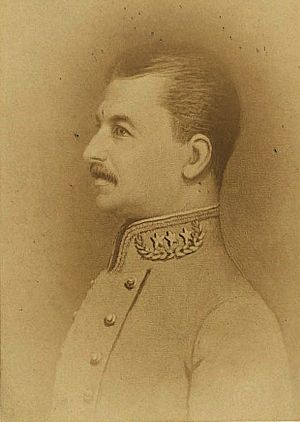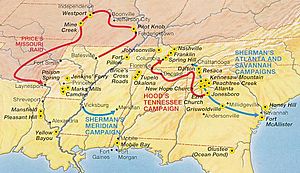Colton Greene facts for kids
Quick facts for kids
Colton Greene
|
|
|---|---|

Colton Greene
|
|
| Born | July 7, 1833 South Carolina |
| Died | September 23, 1900 (aged 67) Memphis, Tennessee |
| Place of burial |
Elmwood Cemetery in Memphis
|
| Allegiance | |
| Service/ |
Missouri State Guard |
| Years of service | 1861–65 |
| Rank | Brigadier General (Missouri State Guard) |
| Battles/wars | American Civil War |
Colton Greene (born July 7, 1833 – died September 23, 1900) was an American businessman and soldier. He served as a Confederate general during the American Civil War. He mostly led cavalry units, which are soldiers who fight on horseback. After the war, he worked on many successful projects for the public in Tennessee.
Contents
Early Life and Business
Colton Greene was born on July 7, 1833, in South Carolina. Not much is known about his parents or how he was educated. He reportedly never married and didn't talk much about his past.
By 1857, Greene was living in St. Louis, Missouri. He was involved in politics with the Democratic Party there. By 1860, he was a very successful wholesale grocer in St. Louis. He also became a partner in a company called Hoyt & Co. that same year.
Serving in the Civil War
When the American Civil War was about to begin, Colton Greene chose to support the Confederate cause. He was very active in the movement that wanted states to leave the Union in Missouri. This state was a "border state," meaning it was between the Union and the Confederacy.
In 1861, Greene was made an aide-de-camp (a personal assistant) to Governor Claiborne Fox Jackson. He helped the governor organize people who wanted Missouri to join the Confederacy.
Early Military Missions
Greene became a captain in the Missouri State Guard in 1861. Governor Jackson sent him and another captain to Montgomery, Alabama, which was the capital of the Confederacy at the time. Their mission was to ask the Confederate President, Jefferson Davis, for artillery (large guns). They hoped to use these guns to attack a Union weapons storage place in St. Louis. However, they arrived too late, and the Union troops captured the cannons.
Even with this setback, Greene continued to help Governor Jackson. He helped train new soldiers in Jefferson City, Missouri. He also went on missions to Arkansas and Richmond, Virginia, to get support for taking back Missouri, which was increasingly controlled by Union forces.
First Battles and Promotions
On August 10, 1861, Greene experienced his first battle. He served on the staff of General James H. McBride during the Battle of Wilson's Creek in Missouri.
On October 28, Greene was promoted to colonel in the Missouri State Guard. He was assigned to help lead the Confederate 7th District in Missouri. When the commander of that district became sick, Greene was ordered to lead it. He reorganized the soldiers into a brigade, which is a large group of soldiers made of several regiments.
His brigade fought in the Battle of Pea Ridge in Arkansas on March 7–8, where the Confederates were defeated. In this battle, Greene's command was part of a larger army led by General Sterling Price and General Earl Van Dorn. Around 1861, Greene was also made a brigadier general in the Missouri State Guard.
Leading Cavalry Units
After the battle at Pea Ridge, Greene's forces moved to Mississippi. Greene asked for and received permission to go back into Missouri to find more soldiers. By the fall, he had gathered and trained a group of mounted soldiers (cavalry). This group was named the 3rd Missouri Cavalry. Greene was made its colonel in the regular Confederate Army on November 4, 1862.
Greene led the 3rd Missouri Cavalry at the Battle of Clark's Mill on November 7, 1862. In 1863, he led a cavalry brigade during the Battle of Helena in Arkansas on July 4, which was a Union victory.
Greene also took part in the 1864 Red River campaign in the Trans-Mississippi Theater. This was a major series of battles in the western part of the war. He fought in the Camden Expedition and the Battle of Poison Spring on April 18, 1864. His soldiers were held back at first but then entered a gap in the Confederate line caused by Union artillery. Greene closed this gap and helped secure a Confederate victory.
Greene led his brigade during the Battle of Jenkins' Ferry in Arkansas on April 30, 1864. The Confederates lost this battle, and Greene reported 50 casualties (soldiers killed or wounded). While leading a brigade in 1864, Greene was an acting brigadier general in the Confederate States Army.
On June 6, 1864, Greene fought in the Battle of Old River Lake in Arkansas. He tried to slow down Union forces but had to retreat. Later that summer, Greene was arrested and accused of not following orders. However, he was found innocent in a court-martial (a military trial) and returned to his command.
After the trial, Greene fought in Price's Missouri Expedition, which was an unsuccessful Confederate raid into Missouri in 1864. During this raid, Greene again led a brigade of soldiers.
Life After the War
When the Civil War ended in 1865, Colton Greene went back to St. Louis. He found that his business partner and others had taken over his business and property, leaving him with nothing.
He then moved to Memphis, Tennessee, to start over. He became a banker and an insurance agent. In 1871, Greene started his own insurance company and quickly became successful. He then founded the State Savings Bank of Memphis.
Greene also helped organize the city's first public water system in 1886. He edited a report about it called Report on a Public Water Supply for the City of Memphis, February 23, 1886. Greene also helped arrange the first Memphis Mardi Gras, which was very successful. He also played a role in founding the Memphis Public Library.
Colton Greene died in Memphis on September 23, 1900. He was buried there in Elmwood Cemetery.
See also


